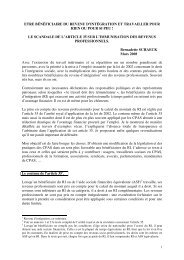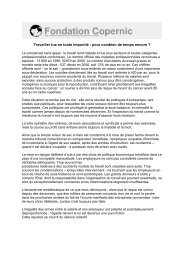Awra Amba RJ 300612 EN - Contacter un comité local d'Attac
Awra Amba RJ 300612 EN - Contacter un comité local d'Attac
Awra Amba RJ 300612 EN - Contacter un comité local d'Attac
Create successful ePaper yourself
Turn your PDF publications into a flip-book with our unique Google optimized e-Paper software.
4. Social organisation<br />
- The lost money handling committee, which manages lost property and returns it to its owner;<br />
- The reception committee, which is in charge of contacts with visitors. It employed a chief guide,<br />
Timbwalel, and a second guide, Amane, both 22 in 2010. The first one studied up to the 11 th<br />
level, the second one up to the 12 th (completion of secondary education) (Jo10b/9); in 2012, it<br />
employs two full-time guides, Nane, Zumra's wife, and Burtukan (Crespo, 2012). Visitors pay<br />
admission fees of 5 birrs, equivalent to 0.20 Euro in 2010 (Crespo, 2011);<br />
- The by law preparation committee which prepares future rules and regulations of the<br />
comm<strong>un</strong>ity; they are decided by the general assembly.<br />
According to At05/61, there were in 2005 fifteen and not thirteen committees, like in 2008 according<br />
to Me09/40 (Question 20 in Annex). One of the above thirteen committees did not exist (the <strong>un</strong>derdevelopment<br />
committee), but three other ones did exist:<br />
- The controlling committee for development committee, which controls this one and reports to<br />
the general assembly; it seems that the development committee and its controlling committee<br />
have been brought together later;<br />
- The weekly development committee, which implements day after day the decisions of the<br />
development committee;<br />
- The controlling committee for weekly development committee, which controls this one and<br />
reports to the development committee and the general assembly.<br />
As the committee members change after each election, each cooperative member should in theory<br />
participate to a committee. However, only a small number of <strong>Awra</strong> <strong>Amba</strong> members have the skills<br />
required to be chairperson, secretary, or treasurer of a committee. They have to be able to read and<br />
write and to have some management skill, and to have access to relevant contacts in the regional<br />
capital. Therefore, 12 to 15 persons share the main responsibilities, i.e. about 10 % of the cooperative<br />
adults. The committee members enjoy no special privileges and receive no material reward. Their<br />
power is limited because the key decisions are taken, not by them, but by the general assembly of the<br />
cooperative members, and because they are subject at any time to its power of recall (At05/58;<br />
Ya08/114-115; Me09/55). It should be <strong>un</strong>derlined that the fo<strong>un</strong>der Zumra is member of both<br />
development and reception committees (Jo10b/9).<br />
According to figures of At05/62, each of the 15 committees (in 2005) brings together 3 to 5 people<br />
(1 to 4 men and 0 to 3 women), except the by law preparation committee, which amo<strong>un</strong>ts to 15<br />
people (8 men and 7 women): see Table 3. The average number of members is 4.5, and 3.8 when this<br />
particular committee is excluded. Because women share the household responsibility with men, they<br />
take responsibility in the comm<strong>un</strong>ity (At05/85): they acco<strong>un</strong>t for 44 % of committee members,<br />
which is lower than the 60 % of women in the population over 19 years, and even than the 51 % of<br />
women in the general population for all ages, that same year 2005. Only 6 committees among 15<br />
have a women's participation equal to or slightly greater than the weight of women in the adult<br />
population, but 3 committees have a women's participation more than two times lower than their<br />
weight in the adult population. Women are especially very much absent in the main committee, the<br />
development one, and in the weekly development committee, where they acco<strong>un</strong>t in both cases only<br />
for one member among five. They are not especially present in committees dealing with a priori<br />
female issues like education, care, elderly or sanitation. Women are leading some of the committees<br />
(Ya08/79).<br />
According to the comm<strong>un</strong>ity leaders we have contacted, in 2010, the development committee<br />
amo<strong>un</strong>ted for 10 members, including 5 <strong>un</strong>der 30 years, one between 30 and 35 years and 4 over 35<br />
years, including Zumra; 5 among the 15 members of the by law preparation committee were <strong>un</strong>der<br />
35 years; 3 among the 5 cooperative leaders were <strong>un</strong>der 30 years. The continuity seems therefore<br />
assured.<br />
43 / 85

















